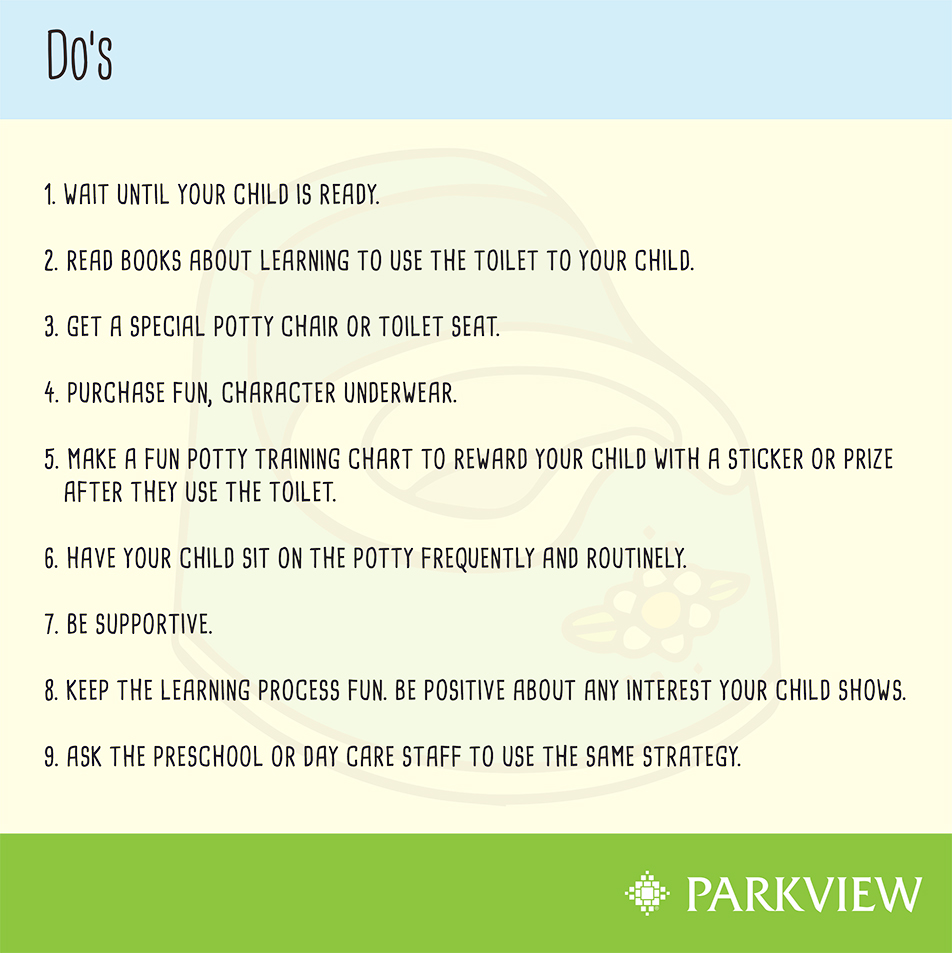
Potty training. The oh-so dreaded but liberating task every parent must face during their child’s toddler years. It seems every friend, family member and online resource has suggestions for the best way to go about potty training, but the truth is, every child is different. What might have worked for your friend’s child, may not work for yours. But there is good news – there’s a variety of techniques to try. Whether it’s a verbal, physical, social or other training approach, something will fit. By learning and understanding your child’s unique personality, you can make toilet training a much less dreaded task.
We spoke to Lisa Bergeron, MD, Parkview Physician’s Group – Pediatric Developmental Care about this important phase in a child’s life. Dr. Bergeron works closely with children – and their parents – at our Children’s Specialty Clinic located in the Women’s and Children’s Hospital at the Parkview Regional Medical Center campus. Here are a few helpful tips Dr. Bergeron suggests when training your little one.
POTTY TRAINING DO’S
- Wait until your child is ready.
- Does he know the difference between feeling wet or dry?
- Can she stay dry for at least two hours?
- Can he sense when he has to urinate or have a bowel movement?
- Can she get to the potty in time (on own or with your help)?
- Can he pull pants up/down, or is he ready to learn?
- Does she want to use the potty (at least on some level)?
- Read books about learning to use the toilet to your child.
- Get a special potty chair or toilet seat.
- Place the potty training chair in a convenient location, like the play room. Or, purchase multiple chairs and place them in each bathroom of your house. This gives a visual reminder about her option of using the toilet.
- Purchase fun, character underwear.
- This purchase can help motivate him to use the potty in order to avoid dirtying his cool underwear.
- Make a fun potty training chart to reward your child with a sticker or prize after they use the toilet. You can download ours below!
- Have your child sit on the potty frequently and routinely.
- Tell your child it’s, “time to go potty”, don’t ask if he needs to go. Have him try to go, especially before and after meals, snacks, naps and bedtime. It's important to remind him that what goes in, must come out, so trying to after eating is helpful.
- Be supportive.
- Celebrate after she uses the potty with praise and hugs. Incentives, such as a favorite food, sticker, special game or a trip to the playground, can be encouraging to your child.
- Keep the learning process fun. Be positive about any interest your child shows.
- Ask the preschool or day care staff to use the same strategy.
- Be sure to keep an extra set of clean underwear at your child’s school or day care.


POTTY TRAINING DON'TS
- Don’t punish or pressure your child.
- Don’t force your child to sit on a potty chair or keep him on it against his will.
- Don’t appear over-concerned about this normal body function. Be casual and relaxed during your child’s learning process.
- When your child begins to use the toilet, don’t expect perfection. Don’t get mad, don’t get frustrated, don’t give up. This is normal.
.jpg)
When should I call my child’s healthcare provider?
- If your child holds back his or her bowel movements or becomes constipated.
- Pain or burning occurs when your child urinates.
- Your child is afraid to sit on the potty chair.
- Your child’s resistance has not improved after 1 month.
- The resistance has not stopped completely after 3 months.
Contact your pediatrician if you have questions or need additional information on potty training your little one.
.jpg)
This content is intended to inform and educate and is not a replacement for medical evaluation, advice, diagnosis or treatment by a healthcare professional.
References Guide to Toilet Training (Copyright © 2003 American Academy of Pediatrics)
Your Child’s Health (Copyright © 2006 B.D. Schmitt, M.D.)



